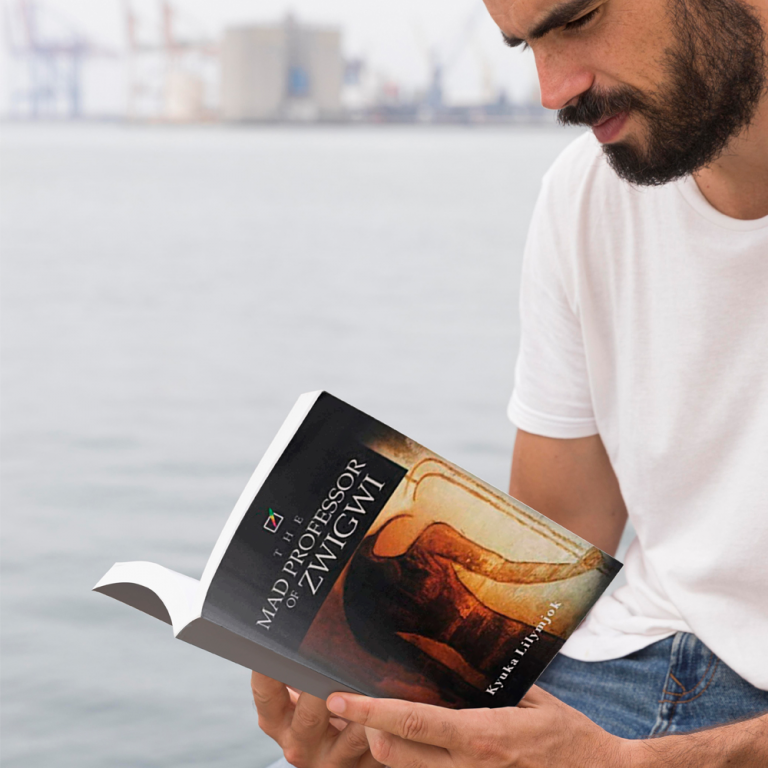Regina Achie-Nege
Abstract
This paper is an evaluation of Kyuka Lilymjok’s My Headmaster as a novel with a moral purpose. The conceptual leanings of the paper are first dealt with, followed by a synopsis and an evaluation of the text in the context of the relationship between literature and moral purpose.
The Concept of Morality in Literature
Morality is simply viewed as the idea of right or wrong; what ought to be done and what ought not to be done. An entry in Wikipedia defines morality as “personal or cultural values, codes of conduct, or social modes. It does not connote objective claims of what is right or wrong, but only refers to that which is considered right or wrong.” This definition implies that what is considered right by the standards of one society may be considered wrong elsewhere. Be this as it may, this paper sets out to examine the place of moral content in literature.
Critics have often engaged in arguments on how morally charged content can impact on literary value. The question is often raised as to whether morally good or morally reprehensible content can make a literary work better or worse. Various scholars have proffered responses to this question. Eileen John (2011) argued that there is no generally acceptable answer to the question, though it is worth asking with respect to each work whether its moral status matters to its literary value. John posited that as long as the moral content of a work does not impede its literary value, it is an acceptable part of the work. However, moral content ought not to be given preference at the expense of literary value.
In his contribution, Robertson Davies argued that some writers have dwelt so much on the moral content of their work to the detriment of the literary value. To buttress his assertion that the moral must not supersede the artistic in a literary work, Davies makes reference to Louisa Alcot’s Little Men. In this novel, Little Ned is a boy with a wavering moral character. Whenever Ned is naughty, his German professor, instead of punishing him, gives Ned the cane to strike him on the hand so hard that Ned himself is moved to tears because he loves the professor very much. This action of the professor causes Ned to change his ways so as not to hurt him. Davies regarded this plot with great disdain, describing it as an idealist plot. He rather expresses his preference for Charles Dickens’ Oliver Twist which, he says, is more realistic, presenting the universe as it is.
Similarly, Neil Lazarus (1980), in his analysis of Ayi Kwei Amah’s The Beautiful Ones Are Not Yet Born, argued that the unmistakable moral tenor of the novel may be justified because the writer avoids idealism. Amah presents realistic characters that could easily be found in Ghana at that time. According to Lazarus:
The novel is transparently a moral work, whose tenor is subjectivistic. This sense of moral earnestness, according to him, ought not however to be interpreted as idealistic, for it stems not from any abstract consideration as to how the “good” or the “just” life might be led but rather from an appraisal of what was actually possible in Ghana after decolonization. (147)
It thus appears that the thrust of the argument of the scholars quoted here is that moral content should not be allowed to distort the artistic value of the literary work for literature is essentially an art. With this position in mind, one may undertake an evaluation of Lilymjok’s My Headmaster as a moral novel.
A Synopsis of My Headmaster
Nto, a little boy growing up in Tyosa, an African village, narrates in great detail the story of his headmaster, Bamai, whom he loves and admires very much. Bamai is strict, upright and fearless and to some extent, hostile. The narrator first encounters the man who would later be his headmaster when the latter rides past the narrator’s house in Tyosa on his motorcycle. Nto is filled with admiration for the headmaster at this point mainly because he owns a motorcycle. He thus tells his father that when he grows up, he would buy a motorcycle too. His father however makes it clear to him that he can only own a motorcycle if he goes to school and becomes a headmaster; then he would have a lot of money to buy anything he wants. That instant, Nto’s love for education is kindled and he begins to pester his father to enroll him in school. As eager as the little boy is, he has to wait till he passes the mandatory test: at least one of the fingers of his right hand has to touch his left ear. Meanwhile, Nto persuades his father to take him to a hill from where he sees the glittering roof of the school buildings.
While Nto is yet to gain admission into the school, he has an unpleasant encounter with the headmaster. He collides with the headmaster while running behind the rim of a bicycle he pushes with a stick as he returns from an errand to collect money owed his mother by a debtor. Nto is so happy with his success on this errand that he runs quite recklessly and does not see the headmaster who is riding towards him. They collide and the headmaster falls off his bicycle. The headmaster becomes more suspicious than angry when he notices that the little boy’s left hand is clenched in a fist. When the boy explains that what he has in his hand is money his mother sent him to collect from a debtor, the headmaster concludes he has stolen the money and proceeds to lead him home. At home, the headmaster is about to whip Nto after declaring to his parents that the boy has stolen someone’s money and only stops when the mother confirms that it is her money. Surprisingly, this unpleasant experience does not quench the boy’s love for his headmaster or his desire to gain admission into school. When eventually Nto is admitted into the primary school at Sarai, he takes the reader through a series of offences by pupils and the punishment dealt out by the headmaster for each offence. No offence seems to escape punishment under the watchful eyes of the headmaster. It could also be extracted from the text that not all the teachers in the school are exemplary in conduct. One of such is Kantiok, a drunk and an unkempt man who was Bamai’s classmate while in college and envies him for being the headmaster.
On completion of studies at the primary school, Nto and his classmates organize a graduation party. They provide plenty of food and drinks with a lot of beer too; this is the first time beer will be bought for a graduation party in the school. After a touching exhortation from the headmaster, all the teachers leave the hall; it is unheard of for teachers to eat or drink before their pupils. However, a drunken Kantiok later returns and insists on gaining access to the hall. The sentry, a pupil who is already drunk himself, refuses to let him in and a brawl ensues. The noise wakes the headmaster who hurries from his house towards the scene of the party only to see the drunken boy advancing threateningly towards Kantiok with a bottle that he has broken, held high in his hand. Out of shock, the headmaster passes out and is rushed to a nearby hospital where he is confirmed dead. This unfortunate incident marks the end of the novel.
An Evaluation of My Headmaster as a Moral Novel
Kyuka Lilymjok’s My Headmaster is transparently a moral work. The sense of morality is brought to the fore through the character of the headmaster. Through his words and actions, he raises questions on the rightness or wrongness of people’s actions. Although he is the headmaster of a school, he does not limit his scrutiny to his pupils alone but serves as conscience to the entire community. The writer has employed the figure of the teacher effectively to further his moral purpose in the work. Several African writers have employed the figure of the teacher for the same purpose. An example is the headmaster in Chinua Achebe’s Chike and the River. The novel is set in the early days of European incursion into Africa. At the time, only a few people had acquired Western education or accepted the Christian religion. In those days, the teacher was highly revered; the ideal teacher was neat, well dressed, relatively rich compared to other members of the community, and more knowledgeable. He was thus, highly respected and the pupils held him in higher regard than they did their parents. This is the position the headmaster occupies in Tyosa:
My headmaster was the discipline master of the village. He did not report erring children to their parents. It was the parents that reported their erring children to my headmaster, particularly if they were already of school age and attending his school. But even if they were not of school age, they could still be disciplined by my headmaster because eventually they would end up in his school… (46)
When the headmaster handed down rather bizarre punishments to some pupils that stole an old man’s pawpaw, Nto says:
My headmaster’s punishments were very strange. But there was no appeal. His judgment was like God’s judgment. One could only pray my headmaster did not pass any judgment on him. If he did, there was no remedy… (143)
With this elaborate assertion of the rights of the headmaster to discipline every child in the community, the stage is set for the reader to appreciate the ensuing events and the roles played by the headmaster. The moral disposition of the headmaster is first brought to the fore during his encounter with Nto, where although the boy is not yet his pupil, he prepares to flog him in the presence of his parents after drawing a hasty conclusion that he must have stolen the money he had in his hand. This is notwithstanding that the boy has told him repeatedly that the money is a debt he recovered for his mother. This disclosure only leads the headmaster into a lengthy lecture on the evils of debt/tax collection, drawing reference from the Bible:
Little child, you should know that debt collectors and tax collectors are not to be trusted to have the truth with them. Remember Zachaeus the tax collector was a sinner till he repented of his sins of tax collection. You can even remember what the publican said about the tax collector that was praying with him in the synagogue. Though Christ condemned the self-righteous attitude of the publican, but we can see that what he was saying about the tax collector was true… (47)
The quoted passage is a misplaced lecture for a little boy who may not be familiar with Bible stories. However, this may also be a deliberate strategy employed by the writer to show that in his zeal to instil discipline, the headmaster goes beyond the present situation and the immediate offender to comment on other issues of morality. This is also characteristic of all other lectures on morality the headmaster delivers to erring pupils in his school:
That was one thing about my headmaster – long speech. A simple question that could be answered in one sentence, my headmaster would go into some sort of lecture. The villagers always stood in need of education and he was the one to give it… (p.3)
Most of this lecture is on morality. For the most part, the pupils do not understand these lengthy lectures, but there is the hope that in the future when the children have grown into adults, they may recall such and it would help tailor their actions to align with accepted values. As the headmaster leaves the house, he directs his admonishment this time, to a more appropriate character, Nto’s mother:
“Woman don’t turn the child into a debt collector” my headmaster admonished my mother in a very stern voice while releasing his hold on me. “You go to church more than I do and therefore should know it is not good for his soul…. “Don’t expose him to money. It would contaminate him. Remember, money is the root of all evil. …You should know more than me.”
Inasmuch as the good intentions of the headmaster for the little boy are not in doubt, one cannot ignore his lack of manners as he hardly cares to respond to the respectful greetings of Nto’s parents when he barges into their house and later, leaves unceremoniously. There is also the veiled sarcasm in his speech to the woman, insinuating that although she goes to church, she does not know what Christians should know. However, these negative attitudes of the headmaster only present him as human and imperfect; a teacher with such airs could easily be found in a backwater African village where teachers are revered and even feared. In this wise, My Headmaster could be considered a realist work, devoid of idealistic characters.
As the narrative proceeds, the tenor of morality deepens. Almost every offence attracts punishment and often, the headmaster is there to mete out the punishment or to ensure that punishment is meted out to the offender. Pupils who come to school late are flogged; the health prefect is punished for keeping dirty teeth; some pupils who steal pawpaw from an old man are made to serve him for some weeks as a form of restitution; the pupils who do a poor job on Malachy’s roof are also duly punished and even Baushe, the elder in the church who is caught stealing pawpaw from Ngai, a poor old man, is not spared by the headmaster; He receives a tongue-lashing from the furious headmaster who goes on to call his pastor and report the incident to him. When Baushe claims it is the devil who caused him to steal the old man’s fruit, the headmaster lashes at him in the following words:
“The convenient defence again”, hissed my headmaster. “I think Christianity has a lot to thank the devil for. The faith won’t survive without him”, he remarked with a heavy dose of cynicism. “I think you need to be sending some of your tithes to the devil for him to continue to keep quiet in the face of your frequent false accusations.” (149)
The stinging sarcasm employed by the headmaster here seems to carry all the weight of his disdain for Christians; yet his frequent reference to the words of Christ to buttress his points show clearly that he holds Christ in high regard. This much he makes clear to the pastor who tries to make him feel penitent for his utterances. This scene presents a common scenario where many Christians carry out evil deeds knowingly, only to make excuses later that they were misled by the devil. After showing, with veiled humour and stinging sarcasm, the futility of this practice, the headmaster charges at the pastor who tries to admonish him for speaking ill of Christianity:
“Talking about right, is it right for a Christian to steal; an elder in the church for that matter?” You can’t hold your flock properly and you are talking of proper and improper things. I don’t believe in buck-passing. I believe in responsibility. Hold your flock and you will have less need of the devil.” (150)
This particular outburst of the headmaster is provoked by the fact that he does not get the desired response from the pastor who seems helpless to chastise Baushe, yet has the nerve to chide him for speaking badly of Christianity. From the image of “buck-passing” employed here, it is suggested that the pastor cannot chastise his flock because of the offertory and tithes he gets from them. Although the moral intent of this episode is not in doubt, the density of narrative devices employed to create artistic value cannot be overlooked. The writer’s employment of imagery, sarcasm and veiled humour makes the entire episode a delightful read.
Another evidence of the moral leaning of Lilymjok’s My Headmaster is in the lengthy lecture he delivers to the discipline prefect on the importance of justice. This outburst is prompted by the prefect’s flogging of Nto harder than other pupils who have come to school late because of an earlier grudge he has against him. The prefect does not like Nto because Nto is brilliant while he is very dull. He has been made discipline prefect only on account of his size and physical strength. This act of discrimination by the prefect provides yet another opportunity for the headmaster to moralise, delivering a lengthy lecture on the question of justice and injustice which, obviously, the prefect at whom the lecture is directed does not comprehend. Reading the excerpt below, one has a feeling that it is the writer speaking directly to the reader through the headmaster:
“I did not make you discipline prefect to discriminate against anybody, but to be fair to everyone. You were appointed to be an agent of justice not a witch-hunter, imbecile”, he said and paused for a while before he continued. ”There is only one thing that counts in this life and that thing is justice. Even God does not count that much. All the strife in the world today is because of injustice. If justice returns to the world today, peace would return. All the hunger in the world is because of injustice. If justice returns, food will return. All the disease affecting the world today is because of injustice. If justice returns, health will return. Of course you are an idiot and so cannot understand what I am saying…” (88 – 89)
As stated earlier, this lengthy speech is presented to an inappropriate audience. It appears that the writer has something to say about the role of injustice in aggravating the woes of humanity, and even though he has not found a suitable audience, he contrives to present it all the same, only to conclude by admitting that the audience obviously, cannot comprehend the speech.
Folktales have also been used in Lilymjok’s My Headmaster to teach morals. Indeed, an entire chapter is dedicated to folktales narrated to the pupils by the headmaster. The folktales narrated have great moral value. The first is about a stingy or selfish girl, Kulak who goes to pick fruits from the forest with her friends but, unlike her friends, does not give any to her mother when she returns home. One day, Kulak’s fiancé dies and she and her friends need good wrappers to tie to the funeral. Her friends get wrappers from their mothers but Kulak’s mother would not give her a wrapper except she goes to the forest to get her some fruits. In the forest, the fruit tree too gives Kulak conditions on which it will give her the fruits and so do all the other things she encounters in the forest. She is thus, delayed. By the time she fulfils all these conditions and eventually gets the wrapper from her mother, she finds out the funeral is over. Kulak is frustrated and embarrassed. The second story is about the dishonest tortoise who would never take the paths others take to the stream but prefers to go through the bush so he can carry out his mischief without being detected. One day, the tortoise’s leg is caught in a hole as he goes through the bush path and he regrets his actions. While performing their role of moral instruction, these interesting stories embellished with songs, also enrich the novel artistically.
A sharp twist of irony is however noticed in the novel: The headmaster who appears to be the conscience of the society and metes out punishment to all offenders has himself been a deviant in the past, if the account of Kantiok the drunkard is correct. A drunken Kantiok narrates painstakingly the numerous crimes committed by Bamai while they were mates in school and for which he was never punished. Kantiok laments in agony:
But the fellow could take big risks and get away with them. Even now, I still don’t know how he got away with some of the risks he took. I think he must be the favoured child of the devil. You know there are certain fortunes the devil puts aside for his children. Bamai no doubt is the devil’s child and it appears the devil has been taking care of his own… (161)
It is ironical that Bamai who accuses Christians of taking advantage of the devil is here portrayed as a great beneficiary of the devil’s favours himself. Kantiok reveals that while in college, Bamai, the headmaster would lie to avoid fetching water which was very difficult to get yet, he would bathe with water that another student has fetched for the house captain only for the innocent student to be punished later. Kantiok also narrates how Bamai deliberately makes his bed to collapse on a senior student who had punished him some time ago for soiling his bed out of carelessness. Bamai gets away with all these and is never punished. This twist in the story shows the sorry depth of double standards that exist in the society where fervent antagonists of a particular societal ill are or were at some point, themselves culprits of same but remain unpunished. This in itself, is injustice which Bamai detests so much, but which he has been a beneficiary.
The last episode in the novel is particularly, a sad one. This is because all through the novel, one has the feeling that the headmaster is overly strict with his pupils, yet, just when he thinks they are almost out of school and can have a certain level of freedom, the result is disastrous. With the benefit of hindsight, one may say that if the headmaster had known the graduating pupils would buy beer for their party and prevented them from doing so, the gateman would not have been drunk and Kantiok may not have been tempted to return to the party too. It is the shock at the actions of his teacher and pupil that leads to the headmaster’s death. If the headmaster had survived this incident, he probably would have chastised himself for not paying closer attention to the pupils’ preparations for the party – a closer attention that would have made him know they would buy beer for the party, which knowledge would have enable him to prevent them from purchasing the beer thereby forestalling the unfortunate events that went with the party.
Conclusion
Reading My Headmaster, Kyuka Lilymjok comes across to me as a novelist in the literary highlands of highminded literature. In this novel, the author exudes moral and artistic power that serves society and literature well, thus killing with one stone two birds.
My Headmaster is a novel with a moral intent. The moral in the novel is clear: crime leads to punishment and waywardness exposes one to danger. The intense moral tone of the novel calls to mind the assertion by Ogungbesan that, “the African writer remains very much aware of his role as the conscience of the society and is, therefore, more committed” (28). This statement is entirely true of Kyuka Lilymjok. Yet for the most part, the writer in My Headmaster balanced morality with the art of skilful narration using such literary devices as sarcasm, irony, humour and imagery among others. Even in its moral earnestness, the novel is not idealistic: It presents to us a headmaster who, although is the conscience of Sarai community, is not perfect. He is often hostile and hardly responds to greetings from the villagers. He has, by Kantiok’s account, been a mischievous child himself; he insults the students when he is angry, calling them ‘idiots’ and ‘imbeciles.’ The message here is that although the headmaster is not perfect, he does his best to instil discipline and honesty in those under his care. The writer thus succeeds in marrying morality and artistry in a creative manner.
Works Cited
Asoo, Ferdinand, I. Children in the eyes of Achebe: A Critical Evaluation of Chike and the River”. The Ker Review Vol. 4, No. 2. Makurdi: Aboki Publishers, 2008. Print.
Davies, Robertson. “Literature and Moral Purpose” www.firstthings.com/1990. Retrieved 30/07/2016. Web.s
Eileen, John. “Literature and the Idea of Morality”. www.willeyblackwellreferenceonline.org.2011. Retrieved 30th August, 2016. Web.
Lazarus, Neil. “Realism of the Intellect, Optimism of the Will: A Reading of The Beautyful Ones Are Not Yet Born” in Research in African Literature, Vol. 18, No. 2. Print.
Ogungbesan, Kolawole. “Literature and Society in West Africa” in Ker, David. Literature and Society in Africa. UK: Evi-Coleman & Co. 2004. Print.
Usman, Kyuka Adamu. My Headmaster. Canada: Trafford, 2009. Print.










